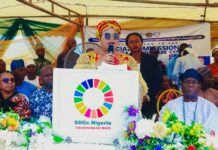Prof. Olufemi Peters, the Vice-Chancellor, National Open University of Nigeria (NOUN), says the institution will continue to collaborate with government and other stakeholders on issues concerning migration.
Peters communicated this on Monday at a one-day sensitisation and awareness workshop on the current migration issues in Nigeria, organised by NOUN Centre of Excellence in Migration and Global Studies (CEMGS) in Abuja.“People will eventually become more aware of NOUN as a unique academic institution and the role it has to play in the migration industry from a multi-disciplinarian and comparative scholarship approach,” he said.
According to the vice chancellor, creating awareness and providing a way forward about pressing and emerging migration challenges in the country, Africa and the globe is one of the core mandates of CEMGS.On her part, Prof. Gloria Anetor, Director, CEMGS, said the acedemia had a big role to play in the migration issue.Anetor said that data and research were needed to ensure that proper dissemination of migration information.
“We need research, we need data, and the academia must feature in this area because if they do not know what is happening in the migration space, then, nothing will be achieved.“So, we proper records to talk with facts and people in the academia really need to know this and NOUN is a special institution that can be heard in all corners of the world.“This is why we need to key into the migration space and interestingly we have keyed into it through the help of our vice chancellor after the creation of the centre in 2020 through TETFund to deliberate on issues of migration,” she said.The director said that the one-day workshop would focus only on global migration issues, challenges, policies and how to improve.One of the resource persons and Coordinator, CSOnetMADE, Dr Emeka Obiezu, said that issues of migration in Nigeria were of two dimensions.Obiezu said that while migration had served as a source of development, it had also become a big challenge to manage.“We know that migration provides us with economic resources for those who migrate and those who are left behind who benefit from the remittances of those who migrated.“And this has gone a long way to alleviate families’ challenges in terms of education, school fees, housing and daily sustenance.“However, in terms of challenges, because of the stringent measures of regular pathways like obtaining visas and getting work permits, some persons take to irregular migration, in other words using unacknowledged routes and processes to migrate.“When these happen it exposes the individuals to exploitation and vulnerability and in many cases, because they take through the desert and Mediterranean sea, you see hazards,” Obiezu said.He said that 30,000 stranded Nigerians in the coast of Mediterranean and Libya, had been repatriated to the country in the last six years.Amb. Catherine Udida, a panel discussant, said that sensitisation was key to solving migration challenges especially in this era of “Japan syndrome.’’Udida, who is a Director, Migrant Affairs, National Commission for Refugees, Migrants and Internally Displaced Persons, said that the commission was coordinating migration issues in the country and was ready to support NOUN in achieving its aim.“People are dying in the desert and the Mediterranean sea enroute to Europe, so this is an opportunity for media houses and other stakeholders to bring to the public, the current crisis we have in the irregular migration.“The stakeholders and media should sensitise people to know that the best way to migrate is through the regular way of obtaining visa and so on,’’ she said.She said that the commission had been in negotiations with the European Union and others to ensure easy pathways for Nigerians who had skills to migrate through the regular ways. (NAN)
By Emmanuel Afonne



